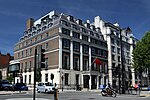Equestrian statue of George Stuart White
1922 establishments in the United Kingdom1922 sculpturesBronze sculptures in the United KingdomGrade II listed statues in the City of WestminsterLondon stubs ... and 4 more
Monuments and memorials in LondonOutdoor sculptures in LondonSculptures of men in the United KingdomUnited Kingdom sculpture stubs

The equestrian statue of George Stuart White is a Grade II listed outdoor bronze sculpture depicting Field Marshal Sir George Stuart White, an officer of the British Army, located in Portland Place, London, England. The sculptor was John Tweed and the statue was unveiled in 1922.An inscription on each side of the plinth reads: Field-Marshal Sir George Stuart White, V.C., G.C.B., O.M., G.C.S.I., G.C.M.G., G.C.I.E., G.C.V.O. Born 1835. Died, 1912. The statue appeared in an exterior shot of Portland Place from Alfred Hitchcock's 1947 American courtroom drama, The Paradine Case, which was set in England.
Excerpt from the Wikipedia article Equestrian statue of George Stuart White (License: CC BY-SA 3.0, Authors, Images).Equestrian statue of George Stuart White
Portland Place, City of Westminster Fitzrovia
Geographical coordinates (GPS) Address Nearby Places Show on map
Geographical coordinates (GPS)
| Latitude | Longitude |
|---|---|
| N 51.5208 ° | E -0.1453 ° |
Address
Portland Place
Portland Place
W1B 1AE City of Westminster, Fitzrovia
England, United Kingdom
Open on Google Maps








